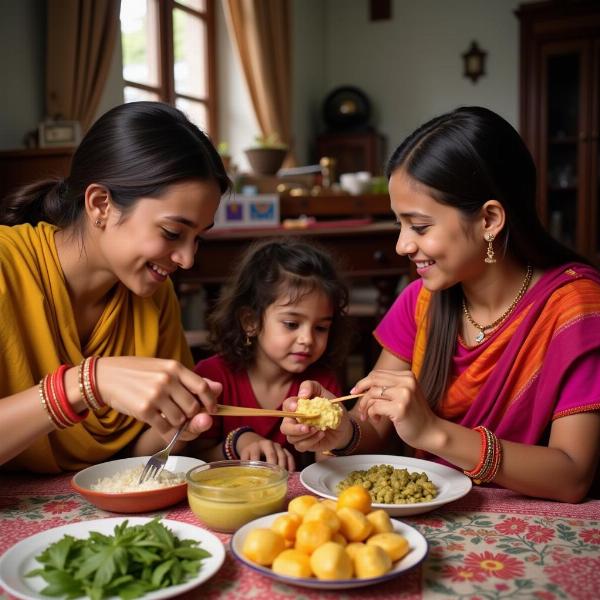Understanding the nuances of a language goes beyond simple vocabulary. “Have you eat food?” while grammatically incorrect in English, reveals a common query about someone’s well-being, especially in Indian culture. This article explores the meaning and cultural context of this question and its various Hindi translations, helping you communicate effectively and respectfully. We’ll delve into the importance of food in Indian society and how it connects to expressing care and concern.
Different Ways to Ask “Have You Eat Food?” in Hindi
The literal translation of “Have you eat food?” isn’t ideal in Hindi. Instead, we use more nuanced phrasing that reflects the cultural context. Here are some common ways to ask someone if they’ve eaten:
- आपने खाना खा लिया? (Aapne khana kha liya?): This is a polite and common way to ask “Have you eaten?” It’s suitable for most situations and shows respect.
- क्या आपने खाना खाया? (Kya aapne khana khaya?): Another polite option, this translates more directly to “Did you eat food?”
- खाना खा लिया क्या? (Khana kha liya kya?): This is a more informal version, suitable for close friends and family. It’s equivalent to a casual “Eaten yet?”
- कुछ खाया? (Kuch khaya?): This translates to “Have you eaten anything?” and implies concern for someone who might not have had a proper meal.
 Asking about Food in Indian Culture
Asking about Food in Indian Culture
The Cultural Significance of Food in India
Food plays a vital role in Indian culture, extending beyond mere sustenance. Sharing a meal is a fundamental social activity, signifying bonding and community. Asking “Have you eaten?” isn’t just a polite inquiry; it’s an expression of care and concern for another’s well-being. It reflects the value placed on hospitality and ensuring everyone is taken care of. This is especially true within families and close communities. The question often precedes offering food, further demonstrating generosity and hospitality.
Understanding the Intent Behind the Question
While the question “Have you eat food?” might sound grammatically incorrect, its intent is clear: to express concern. In India, this question is a common way to show you care about someone’s well-being. It’s a way to check in and ensure they are not hungry or neglecting their needs. It’s less about the grammatical accuracy and more about the emotional connection.
Responding to “Have You Eat Food?”
Responding appropriately is just as important. Even if you haven’t eaten, a polite response acknowledges the care behind the question. Here are some ways to respond:
- जी, खा लिया। (Jee, kha liya.): “Yes, I have eaten.” (Formal)
- हाँ, खा लिया। (Haan, kha liya.): “Yes, I have eaten.” (Informal)
- अभी नहीं, थोड़ी देर में खाऊँगा/खाऊँगी। (Abhi nahin, thodi der mein khaunga/khaungi.): “Not yet, I’ll eat in a while.”
- थोड़ा सा खाया है। (Thoda sa khaya hai.): “I’ve eaten a little.”
Common Scenarios Where You Might Hear This Question
You’ll likely encounter this question in various social situations in India:
- Family gatherings: It’s customary for family members to inquire about each other’s meals.
- Visiting friends: Hosts often ask their guests if they’ve eaten, often as a prelude to offering refreshments.
- Workplace interactions: Colleagues might casually ask about each other’s meals, especially during lunch breaks.
Conclusion
Understanding the cultural context of “have you eat food?” and its appropriate Hindi translations allows for more meaningful interactions. It highlights the significance of food and caring for one’s well-being in Indian culture. By using the correct phrasing, you demonstrate respect and build stronger relationships. So, next time you’re in India, don’t be surprised if someone asks you if you’ve eaten. It’s simply their way of showing they care.
FAQ
-
Is it rude to ask “Have you eat food?” in Hindi? While grammatically incorrect in English, the Hindi equivalents are not considered rude. They are expressions of care and concern.
-
What if I haven’t eaten yet? Respond politely and honestly. Your host will likely offer you something to eat.
-
Is it only asked within families? No, it can be asked in various social settings, including among friends and colleagues.
-
What is the most polite way to ask this question in Hindi? “Aapne khana kha liya?” is a polite and respectful way to ask.
-
What if I’m not hungry but want to be polite? You can acknowledge their concern and politely decline or say you’ve already eaten a little.
-
Why is food so important in Indian culture? Food is seen as a way to connect with others and express hospitality. Sharing a meal is a fundamental social activity.
-
What are some other ways to show care and concern in India? Inquiring about someone’s family, work, or health are other ways to show you care.
Meaning-Hindi.in: Your Trusted Partner for Hindi Translations
Meaning-Hindi.in provides expert Hindi translation services for various needs, from business documents and legal papers to website localization and academic materials. Our team of experienced translators ensures accurate and culturally sensitive translations, bridging the language gap and facilitating effective communication. Whether you need business and commercial translations, certified and legal document translations, technical and user manual translations, website and localization services, educational and academic translations, or quick and urgent translation solutions, we are here to help. Contact us today at [email protected] or call us at +91 11-4502-7584. Meaning-Hindi.in is your one-stop solution for all your Hindi translation needs.